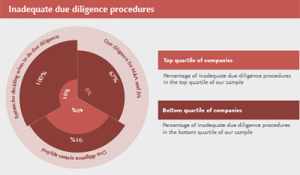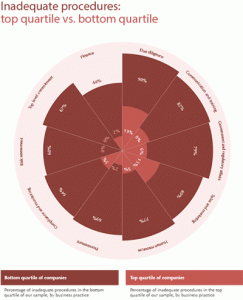Update: Winter 14/15
Combating corruption: are businesses doing enough?
A key area of our work in 2014 working was helping companies to test and strengthen their anti-corruption controls. We saw some excellent practice implemented, but also know how difficult it can be in some of the world’s more challenging markets.
Consequently, many organisations are still struggling to implement robust procedures. Our anti-corruption white paper Combating corruption: are business doing enough? revealed that over a third of the anti-corruption controls we have assessed were found to be inadequate.
Corruption is likely to remain high on the corporate agenda in 2015, with the multimillion pound fines we have seen in the recent past looking set to continue.
The Government has reinforced its commitment to tackling corruption with the publication of the UK Anti-Corruption Plan in December, pledging to strengthen law enforcement and increase protection for those who report corruption.
Whistleblowing is therefore likely to retain its prominence in the coming year, with companies seeking to implement effective systems to monitor concerns.
Other business ethics issues that are likely to come under the spotlight in 2015 include directors’ remuneration, corporate taxation, forced labour, slavery, trafficking and child protection.
The challenges are plentiful and we wish you all the best for the coming year.
Michael Littlechild
Anti-corruption due diligence the hardest control to put in place
Sixty three per cent of the anti-corruption due diligence controls that we assessed were graded inadequate.
Developing a process to get this challenging area right is vital for businesses. Failure to do so places companies at greater risk from corrupt practices. It also weakens any defence should corruption occur and charges are brought. As investigations into GSK, Rolls Royce and Alstom have shown, companies are more at risk from corruption by third parties and intermediaries than in any other area of their business.
With many multinationals having tens of thousands of suppliers it is not surprising that this is proving to be a problem.The temptation to do superficial due diligence on thousands to tick the right box is great.
However, the best approach is to begin with a careful risk-based assessment of suppliers, to identify those that pose a real threat to the organisation.
Carefully designed decision trees can be invaluable, but few companies are using them effectively to risk-assess suppliers in order to gauge a level of due diligence that is appropriate and reasonable. The best companies take a proportionate approach, applying a range of checks depending on any red flags identified.
Gap emerging between those companies succeeding in putting adequate procedures in place and those that are not?
While the overall results of our white paper show that businesses are generally struggling to embed strong adequate procedures, we are also seeing the emergence of a considerable gap between high and low performing companies.
In analysing the results of our assessments, we divided the companies into four quartiles, according to average assessment grades. The disparity between the top and bottom performing companies is striking. The biggest gap is in the area of ABC controls in government and regulatory affairs where 80 per cent of the companies in the bottom quartile have inadequate procedures versus only 6 per cent in the top quartile.
Our white paper looks at the reasons why and provides examples of best practice.
In Brief...
UK Bribery Act: a powerful tool or a damp squib?
This was the question raised at our winter Business Ethics Debate at the House of Lords when we looked at the UK Bribery Act and the progress companies have made putting adequate procedures into place.
At the debate, the Bribery Act was likened to corporate manslaughter legislation; coming in with a clarion call but to little effect as prosecutors resorted to soft cases to bring about a conviction resulting in little real change.
While it is clear that the Bribery Act has changed the debate, its real impact on corporate behaviour may well depend on forthcoming cases.
The Act has undoubtedly moved the goalposts, knocking the US Foreign Corrupt Practices Act off its perch as the gold standard of anti-corruption legislation, to become widely regarded as the new benchmark.
Businesses are rightly preoccupied about enforcement and the prospect of prosecution.
Part of this picture is the introduction of Deferred Prosecution Agreements (DPAs), widely considered to be the most significant change to law enforcement weaponry.
However, while they were welcomed, businesses were advised to proceed with caution. Getting this right will be vitally important for organisations. If a company is too slow, the SFO may already know of the offence and the chance to do a deal will be gone. Too quick, and you risk telling the SFO something they may never have found out and have to live with the consequences.
Businesses were advised to take a deep breath and launch a swift but rigorous investigation before attempting to obtain a DPA. A thorough assessment of the problem is needed along with an understanding of whether or not a DPA will be offered. Unlike the States, a DPA is not considered a right in he UK, but is the result of a court procedure.
A strong ethical culture that permeates throughout an organisation was seen as essential to the solution. Equally important is the need to demonstrate that adequate procedures are in place and working effectively.
Compliance teams were advised to ensure that appropriate audit systems were in place generating a paper trail to show compliance should the need arise.
Can companies do business ethically in the Middle East?
A group of senior figures from a cross-section of multinational organisations joined GoodCorporation for the Autumn Business Ethics Debate at the House of Lords in October.
With five countries in the region in the bottom ten of Transparency International’s Corruption Perceptions Index 2014, this is clearly a problematic part of the world in which to do business.
Particular areas of concern were discussed including the use of agents and intermediaries, gifts and hospitality, facilitation payments and the treatment of workers on construction projects. Public procurement also remains weak in poorly governed states, posing a real risk to companies.
For a full summary of the debate visit our website



